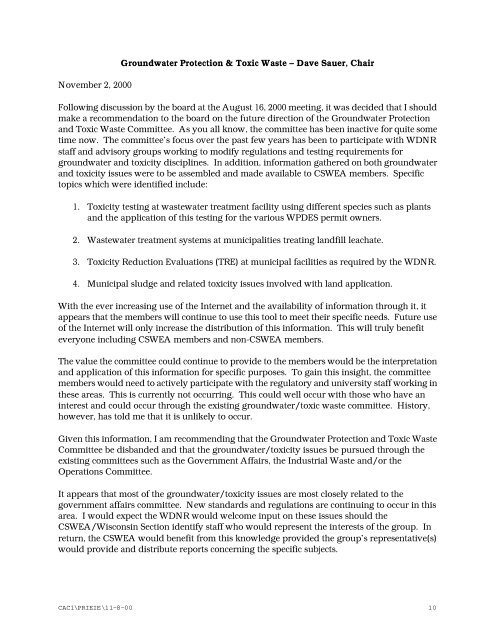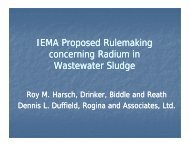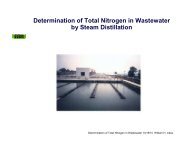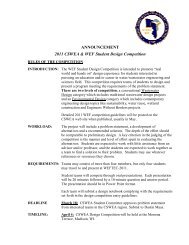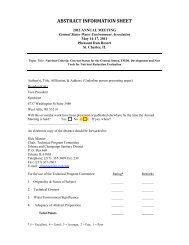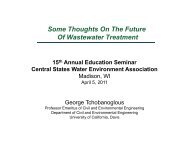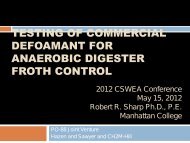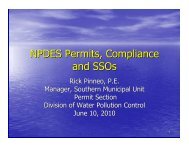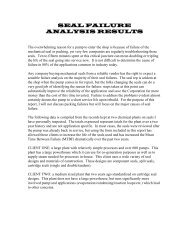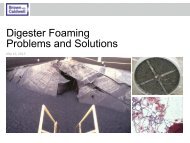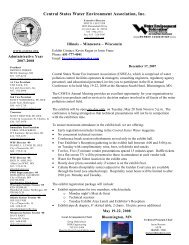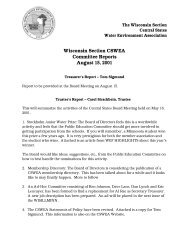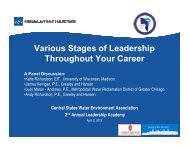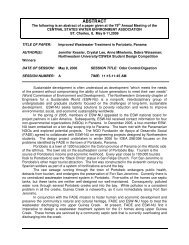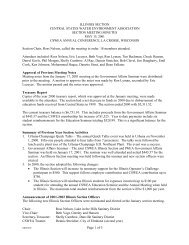November 8, 2000 Annual Business Meeting - Central States Water ...
November 8, 2000 Annual Business Meeting - Central States Water ...
November 8, 2000 Annual Business Meeting - Central States Water ...
Create successful ePaper yourself
Turn your PDF publications into a flip-book with our unique Google optimized e-Paper software.
<strong>November</strong> 2, <strong>2000</strong><br />
Groundwater Protection & Toxic Waste – Dave Sauer, Chair<br />
Following discussion by the board at the August 16, <strong>2000</strong> meeting, it was decided that I should<br />
make a recommendation to the board on the future direction of the Groundwater Protection<br />
and Toxic Waste Committee. As you all know, the committee has been inactive for quite some<br />
time now. The committee’s focus over the past few years has been to participate with WDNR<br />
staff and advisory groups working to modify regulations and testing requirements for<br />
groundwater and toxicity disciplines. In addition, information gathered on both groundwater<br />
and toxicity issues were to be assembled and made available to CSWEA members. Specific<br />
topics which were identified include:<br />
1. Toxicity testing at wastewater treatment facility using different species such as plants<br />
and the application of this testing for the various WPDES permit owners.<br />
2. Wastewater treatment systems at municipalities treating landfill leachate.<br />
3. Toxicity Reduction Evaluations (TRE) at municipal facilities as required by the WDNR.<br />
4. Municipal sludge and related toxicity issues involved with land application.<br />
With the ever increasing use of the Internet and the availability of information through it, it<br />
appears that the members will continue to use this tool to meet their specific needs. Future use<br />
of the Internet will only increase the distribution of this information. This will truly benefit<br />
everyone including CSWEA members and non-CSWEA members.<br />
The value the committee could continue to provide to the members would be the interpretation<br />
and application of this information for specific purposes. To gain this insight, the committee<br />
members would need to actively participate with the regulatory and university staff working in<br />
these areas. This is currently not occurring. This could well occur with those who have an<br />
interest and could occur through the existing groundwater/toxic waste committee. History,<br />
however, has told me that it is unlikely to occur.<br />
Given this information, I am recommending that the Groundwater Protection and Toxic Waste<br />
Committee be disbanded and that the groundwater/toxicity issues be pursued through the<br />
existing committees such as the Government Affairs, the Industrial Waste and/or the<br />
Operations Committee.<br />
It appears that most of the groundwater/toxicity issues are most closely related to the<br />
government affairs committee. New standards and regulations are continuing to occur in this<br />
area. I would expect the WDNR would welcome input on these issues should the<br />
CSWEA/Wisconsin Section identify staff who would represent the interests of the group. In<br />
return, the CSWEA would benefit from this knowledge provided the group’s representative(s)<br />
would provide and distribute reports concerning the specific subjects.<br />
CAC1\PRIEIE\11-8-00 10


